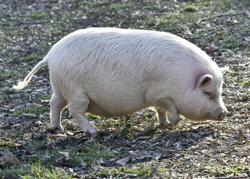State supreme court sides with farmer over pig manure plan

Image from Shutterstock.com.
A divided Pennsylvania Supreme Court decided Thursday that a farmer did not have to obey his township’s regulations when managing manure on his hog farm.
In the majority opinion, Justice Max Baer wrote that officials in Montour Township in Columbia County overstepped their authority by asking Scott Sponenberg to provide legally binding assurances that his proposed operation of 4,800 pigs would not have adverse impacts—such as ground and surface water contamination, noise and odors—on neighbors.
The township’s adverse impact rules are stricter than the requirements of Pennsylvania’s Nutrient Management Act, which regulates manure handling operations on farms, Baer said.
“The act preempts any local regulation of nutrient management to the extent the local regulation imposes requirements that are stricter than, inconsistent with, or in conflict with the state law requirements,” Baer wrote.
Even though Sponenberg was not required to file a manure handling plan for his small farm under the Nutrient Management Act, he remains protected, the justice added.
The Patriot-News has coverage of the decision.
Sponenberg filed an application to build a swine nursery barn with a manure storage facility with the Montour Township Zoning Hearing Board in 2013. He appealed to the Pennsylvania Supreme Court after a Commonwealth Court panel held that he was bound by his township’s regulations for manure management.
In the dissenting opinion, Justice Kevin M. Dougherty wrote that he would have upheld the lower court’s decision.
The majority’s ruling that Sponenberg’s proposed operation is excused from Nutrient Management Act requirements and local regulations is “untenable,” Dougherty said.
“It is based upon a flawed statutory construction analysis that undermines this court’s jurisprudence with regard to preemption principles and curtails long-established municipal authority to ‘make such additional regulations’ in furtherance of state law as are reasonable and appropriate to the needs of the particular locality,” he wrote.



